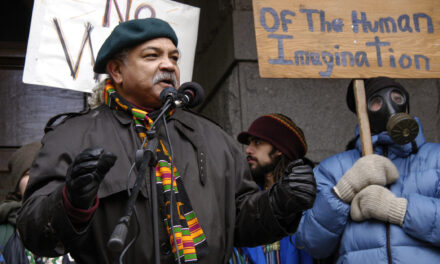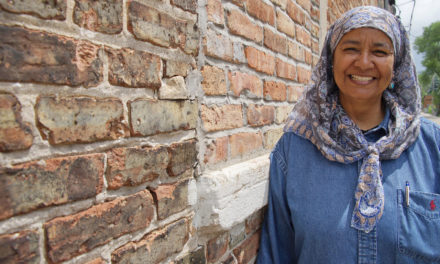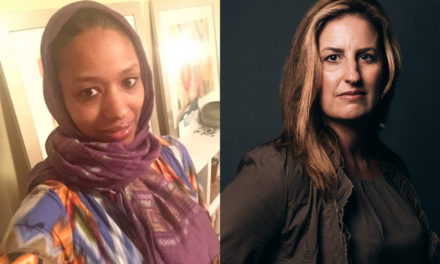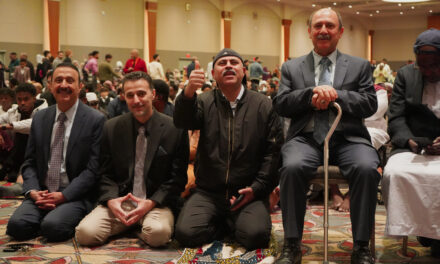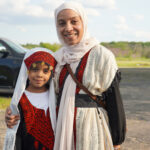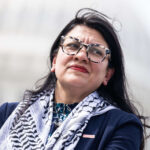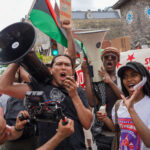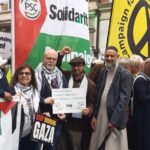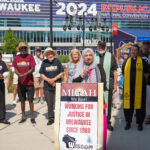
Graphic courtesy of PalestinePortal.org
The Shrinking Palestine map series shows the development of Israeli settlements (white) and the Palestinian’s loss of land (green) from 1947 to 2005.
Bombarded with horrific news and distressing images from Gaza, along with misinformation in the media and a lack of historical knowledge, many Americans don’t know what to make of the violence taking place there today. Some ask Muslim and Arab American friends or colleagues what is happening.
What do you say? How do you start?
The first step is educating ourselves, agreed Othman Atta and Munjed Ahmad, attorneys and members of the Islamic Society of Milwaukee’s leadership who spoke at the first of a series of community discussions on Israel’s occupation of Palestine and Israel’s War on Gaza. Atta and Ahmad reviewed the history of the Israeli occupation, its violations of international and human rights law, and the involvement of the United States government.
“We all have the responsibility to reach others and communicate,” Atta told more than 100 people Nov. 4 at the ISM Community Center in Milwaukee. “This is the part of the struggle we can fulfill.”
See the Nov. 4 program here.
Two more community discussions will take place this weekend:
ISM Core Youth Night: Atta and Ahmad will speak again tonight, 6:30 – 8:30 p.m. at the ISM Community Center, 815 W. Layton Ave., in an ISM Core program, Palestine: My People, My Cause, for youth ages 11-14. No registration is required.
ISM Core Young Adults & Professionals: Ahmad (an attorney), Nisreen Atta (a nurse/supervisor) and Ayesha Khan (an HR executive) will discuss how to engage in productive discourse in the workplace about current events in Palestine in a program titled Reclaim the Narrative. Ahmad, Atta and Khan are experienced in navigating discussions in the workplace from legal, HR and employment perspectives.
This program for young adults and professionals, ages 22 and up, will be held Saturday, Nov. 11, 6 – 8 p.m., at the ISM Community Center, 815 W. Layton Ave. You may submit questions to be addressed here: bit.ly/reclaimingnarrative.
See paraphrased highlights of the Nov. 4 community discussion here:
An Islamic perspective on the current violence
Atta: Muslim Americans may be asked if we condone Hamas’ actions on Oct. 7. If something is done as part of the resistance that is not allowed by Islam, of course, we don’t support that. Islamically, it is wrong to attack civilians or destroy civil infrastructure or houses of worship. As part of our faith, we just don’t do that.
But do we believe people who are occupied and oppressed have the right to resist? Yes. It’s not just a right. We have an obligation to help people who are oppressed. If anyone, not just Muslims or people from our community, are oppressed, we have to support them.
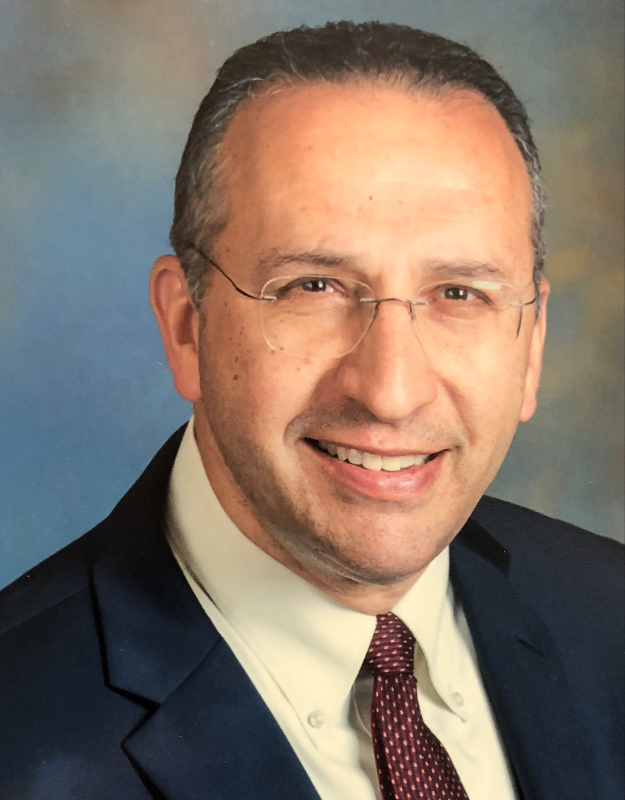
Othman Atta
People of other faiths agree. There are many Jewish people in this anti-Israel struggle like those in Jewish Voice for Peace, who say, ‘Not in our name.’ In my view, Israel is like ISIS. We are seeing hundreds, thousands of innocent civilians bombed—entire apartment complexes.
Many of the 2.3 million Palestinians in Gaza have lived their entire lives under the subjugation of a brutal, inhumane system. If Palestinians try to assert their freedom, they are put down. I recommend seeing journalist Abby Martin’s documentary Gaza Fights for Freedom about a series of protests held in 2018 by Palestinians in Gaza called the ‘Great March of Return.’
It’s been 75 years now and the Palestinians have not been allowed to return, even though there have been a number of U.N. resolutions calling for their return, even though international law is on their side. What stops the laws from being implemented? Our government, the United States, has vetoed more than 30 U.N. Security Council resolutions.
Palestinian Muslims and Christians are under Israeli military rule. Israeli settlements are expanding in Arab Palestinian land. Israelis build settlements that have Jewish-only roads and they get money from the United States.
Early history of the occupation
Atta: Today’s conflict did not begin Oct. 7. Since the 1800s, European Jews wanted to create a state. They were being persecuted. In 1917, the British promised the Zionist movement the land of the Palestinians, even though the British didn’t own it. From 1917 to 1947, the British facilitated many Jews moving from Europe into Palestine. This is where the conflict began.
There have always been Jews living in Palestine. The Palestinian Jews lived in peace with the Muslims and Christians there. My grandmother used to tell me about how Orthodox Jews couldn’t do anything during the Sabbath so they would ask Muslim or Christian neighbors to help them.
The problem with the Zionist movement is they were not coming in to live with the Palestinians. They were coming in to replace them. As persecution of Jews continued in Europe, their numbers swelled. By 1947, they had become almost 1/3 of the population.
They started Jewish paramilitary groups, regarded by the British and others as terrorists, that attacked both the British and the Palestinians. Menachem Begin, leader of the Zionist militant group Irgun, led a revolt against the British in Palestine. The British consider Begin a terrorist. He became the sixth prime minister. Yitzhak Shamir, the head of the Zionist militant group Lehi, called by the British “the Stern gang,” became the seventh prime minister. These are people who were terrorists who killed innocent people.
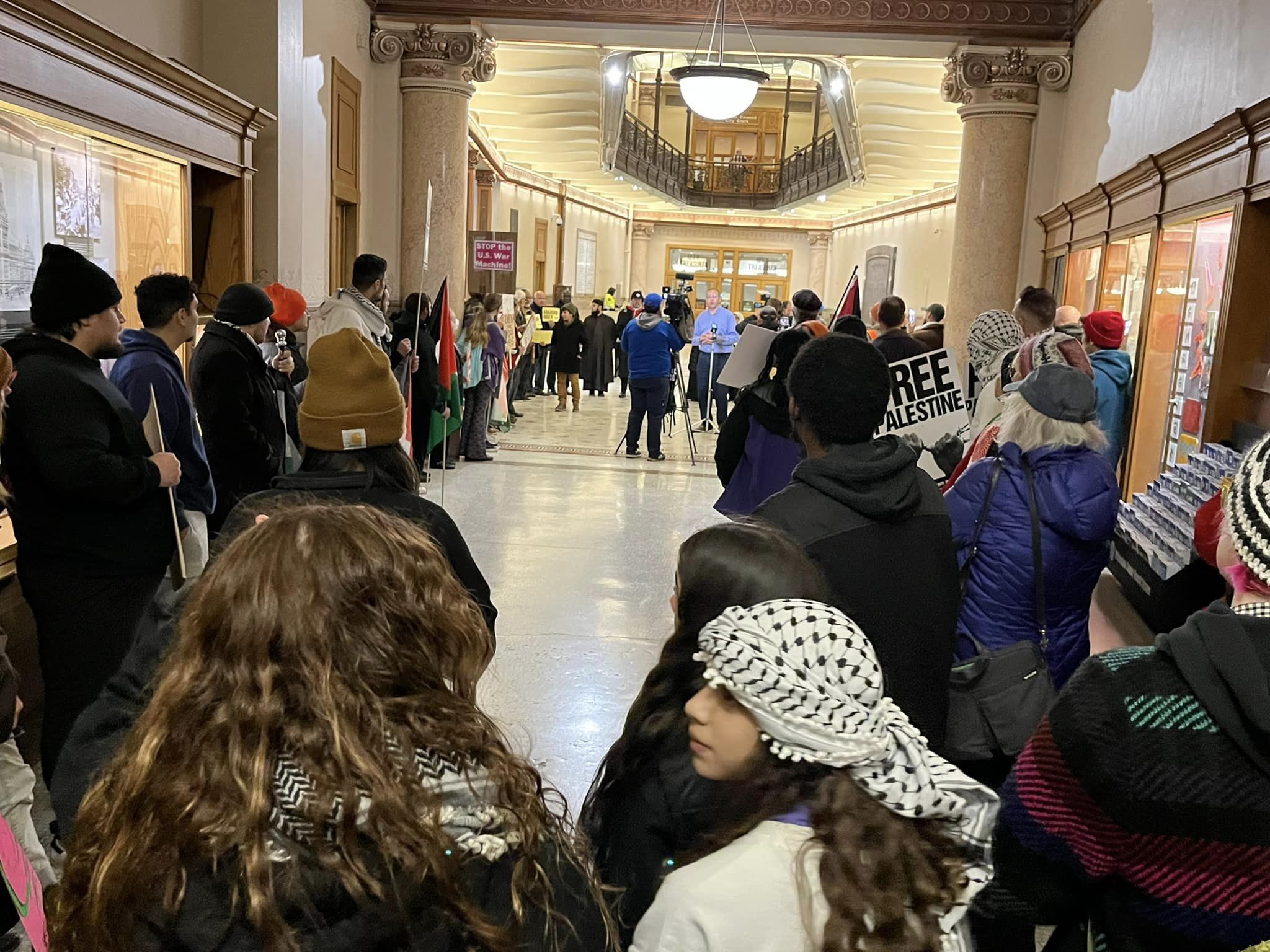
Photo by Yaseen Najeeb
Othman Atta spoke at a press conference Thursday at Milwaukee City Hall during a protest of genocide in Gaza.
Creation of a Jewish State
Atta: The British decided they couldn’t handle the problem between the Zionists and Palestinians so they gave it to the United Nations, which at that time was largely Western nations. The U.N. decided to partition Palestine into two states: a Jewish state and an Arab state. The Jewish state was given the majority of the land, including the best farmland and the coastal lands. This happened Nov. 29, 1947.
Between Nov. 29, 1947, and the time Israel declared itself a state on May 14, 1948, some of the most infamous massacres of Palestinians took place. Jewish Irgun, Haganah and Stern Gang militias committed dozens of massacres of men, women and children in Palestinian villages. Historians later discovered it was their plan to evict as many Palestinians as possible to take over areas that were supposed to be part of the Arab state. The massacres would encourage people to leave.
What happened on May 14, 1948? You have probably heard stories of Arab countries coming in and attacking Israel, and that Israel defended itself. That’s not the reality. Most Arab countries were still under colonial rule. Yet, some Arab countries came in to try to protect land assigned to the Arab state. They could not overcome the Zionist paramilitary groups, who were receiving arms from European countries, particularly the British.
By 1949, Israel controlled 78% of original Palestine. What remained was Gaza and the West Bank.
What happened to the Palestinians? Some fled to Egypt, Jordan, Syria and Lebanon, where they are still refugees. People have a right to flee, according to international law. Later, they also have a right to return but the Palestinians have not yet realized that right.

Photo by Yaseen Najeeb
Protesters at Milwaukee City Hall Thursday called for an immediate ceasefire in Gaza.
Israeli expansion
Atta: From 1948 to 1967, Israel erased over 500 Palestinian villages from the face of the Earth. They destroyed or took over homes.
The Israelis launched another war in 1967 and occupied the Gaza Strip, the West Bank, the Sinai of Egypt and the Golan Heights of Syria. Since that time, the West Bank has been under Israeli occupation.
Meanwhile, Jewish settlements expanded in the West Bank and Gaza. But Gaza became a huge problem for them because of resistance. So, Israel took their settlements out of Gaza. In 2006, Hamas was elected to rule in Gaza. Many Christians also voted for Hamas because its opponent, the Palestinian Authority, was seen as corrupt.
Israel then decided to put a total embargo on Gaza. Nothing and no one could go in or out without Israeli approval. That’s when Hamas began digging tunnels. The tunnels were the only way to get things into Gaza. Israel didn’t allow some medical equipment, like X-ray machines, into Gaza because they said it could be used for military purposes. At the same time, if someone had cancer in Gaza, they needed approval from the Israelis to leave for medical treatment. It was not always given.
This process of waiting at checkpoints for approval humiliated people. Since 2006, Gaza has been called “a concentration camp” or “an outdoor prison.” If any Palestinians rise up to assert any independence or argue for their rights, they are risking their lives.
International law in occupied Palestine
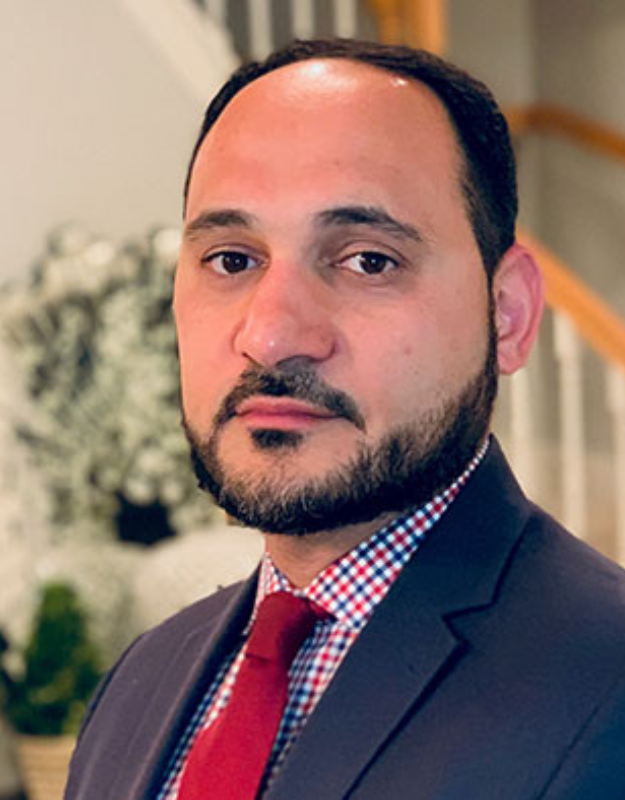
Munjed Ahmad
Ahmad: In our discussion today, we are talking about Israel as the occupant in Palestine. International law says the occupant does not acquire sovereignty of the territory they occupy. Occupation is a temporary situation. If you base it on land taken in 1967, it has been 56 years. If you base it on land taken in 1948, it has been 75 years.
Annexation: What shows on the maps of the area from 1947 to 2005 is how much land has been taken from the Palestinians through annexation. Annexation is the act of a state claiming sovereignty over a part of a territory of another state. The territory under Israeli control is actually much greater than even on the last map shown (from 2005).
To give you some perspective on how much Palestinian land remains, they talk about East Jerusalem not being annexed but Israel has actually taken control over it. They control every aspect of their lives in East Jerusalem, as they do in the West Bank and the Golan Heights, taken from Syria. They took the Sinai Peninsula but have since returned it to Egypt. All this is in violation of international law. Unfortunately, no one is doing anything about it.
Have you heard about the separation wall? It is also an annexation because it is constructed on Palestinian land.
Ensuring safety: During an occupation, the occupying power must take measures to ensure public safety and order. Yet, in the West Bank, where Hamas has no authority, Israeli settlers have burned down Palestinian homes and olive groves. Last Saturday a settler shot a Palestinian harvesting olives from his own grove. The settlers are surrounded by Israeli soldiers, not to stop the settlers but to protect them. U.S. Secretary of State Anthony Blinken encouraged the Israeli government to take action against what he called “extremist violence” being committed against Palestinians by Jewish settlers.
In 2023 alone, there were over 300 Palestinians killed in the West Bank, either by settlers or by Israeli occupation forces. There has been an increase in settler violence since Oct. 7. Yet, the Israeli government is giving settlers rifles and shotguns.
Provisions: Under international law, the occupying power must ensure sufficient hygiene and public health standards, as well as food and medical care to the population under occupation. Israel controls everything that goes in and out of Palestine, period, full stop. Israel has an absolute duty under international law to provide food, medical care and provisions for hygiene health to the entire population under its subjugation. Limiting power, water, food and medical supplies is a flagrant violation of international law. Yet, no one has stopped them.
Forceful transfer is prohibited: The occupying power cannot remove Palestinians from Palestinian land. Yet, we know Palestinians have been continuously forced out of their homes. And recently in Gaza, 1.1 million Gazans had to move from the north to the south.
Replacing the indigenous population with your own is prohibited: Having Israelis live on Palestinian lands is a clear violation of international law. The settlements are violations of international law.
Collective punishment is prohibited: You cannot punish an entire population for the acts of some. This has been happening in Palestine for years: 2006, 2008, 2012, 2014, 2018, 2022 and now in 2023. In Gaza, Israel’s military has been carpet bombing the entire area, including residential facilities with the excuse that there is one Hamas fighter in it.
The siege on Gaza of the past 16 years is another form of collective punishment.
They are not hiding it. Why? Because no one is stopping them, particularly the United States.
Disproportionate use of force: International law does not allow for the disproportionate use of force, only the force that is necessary to subdue an actual threat. Today more than 10,000 Palestinian people in Gaza have been massacred, about half of them children. More than 40% of the civil infrastructure has been destroyed. That is not a proportional use of force.
Taking hostages is prohibited: In my personal opinion, the 2.3 to 2.5 million people of Gaza have been hostages for 16 years. They couldn’t leave Gaza. Others could not enter. And in the West Bank, there are about 700 checkpoints. On top of this, people are arrested without being given any idea of the charges.
Destruction or confiscation of private property is prohibited: There are many reports of Palestinian homes being taken or destroyed. It happens all the time.
Personnel of the International Red Cross must be allowed to carry out humane activities: In Gaza, ambulances and hospitals have been bombed and other obstacles have prevented aid workers from helping people.
Atta and Ahmad went on to describe many other violations of international law in the current violence and historically.
